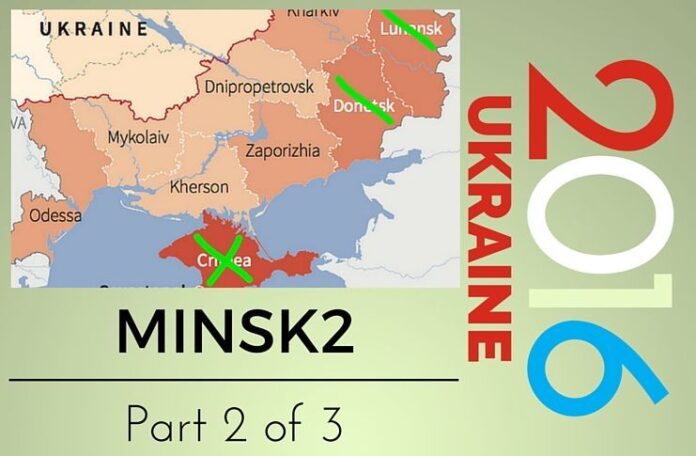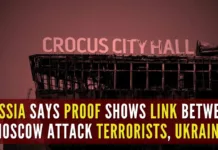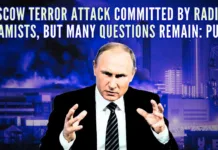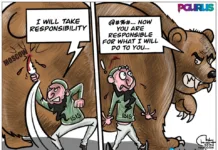
This is a continuation of the article whose Part 1 can be accessed here
But the West were hatching plans to attack Russia since 2009-10, ostensibly to protect the Baltic countries, Latvia, Lithuania, and Estonia.8 This strategy has been declared objectionable openly by the Russians, and would be dealt with appropriately.
Meanwhile, the Orange Revolution of 2004-5 showed that Ukraine was run like an immature developing country: the 2004 elections showed that the results were rigged and led to street protests. One of the two Viktors contesting the elections survived as Ukraine’s leader. The street erupted again in 2014 when Viktor Yanukovych was deposed in the Maidan Revolution. The controversial French film by Paul Moreira, “Ukraine, les masques de la révolution,” reveals the chaos when Yanukovych was deposed.9 While Russia sees the successor, Poroshenko, as illegitimate, Ukraine’s view is revealed by the case brought against Yanukovych; Ukraine’s Prosecutor General has filed five criminal cases against him, including embezzlement of public funds and complicity in violence in Kiev’s Maidan Square. Yanukovych who was deposed on February 22, 2014 sued the Ukrainian Government in the European Court, in return, for “violating his rights repeatedly,” and “discriminatory treatment due to his political status and opinions.”
But one of the most serious consequences of mob rule was the May 2, 2014 massacre in Odessa when the street set fire to the Trade Union House in the city centre and killed 45 Ukrainian Russian citizens who were taking shelter there. The activists showed traits of extreme nationalism: they wanted the Ukrainian language instead of Russian, no debauchery, against democracy, and so on. They wanted Russians to leave Ukraine and were against Russian soldiers protecting Russians in Eastern Ukraine.10 The net result was that the Ukrainian Russians claimed autonomy for Donbass and Lugansk, two large provinces in Eastern Ukraine, and Crimea had rejoined Russia. Putin speeded up the processing of Russian passports to facilitate citizenship, and to ease the fear of Russians being threatened in Ukraine.
Poroshenko’s view was that as the country’s Commander-in-Chief he would continue his war with Russia in order to regain sovereignty over his country.11 Meantime, he has signed a free trade agreement with the EU, effective January 1, 2016, which he regards as “a first, but most decisive step towards European membership.” He hopes to join the EU formally by 2020.
Ukraine should realize that Russia does not object to any of its satellites doing business with the EU. In fact, Russia, itself, supplies Europe with 30% of its oil and is looking forward to building more pipelines to the EU. What it vehemently objects to is NATO on its borders.
About a year ago, on February 15, 2015, Russia and Ukraine drew up the Minsk 2 Agreement which was not fully implemented as the constitutional boundaries of the two contested republics, Donbass and Lugansk, were disputed. Since April 2014, 9,000 people have died. Consequently, Poroshenko wants the two republics as part of Ukraine, and Minsk 2 implemented by the end of 2016. Both parties feel that the issue of Crimea will take longer to settle. Russia, too, seeks a settlement in order for sanctions to be lifted. Parliamentarian Boris Gryzlov has been appointed to finalize this deal with Ukraine.12
Given the Minsk 2 settlement with Gryzlov, a cessation of war, and the two Juncker-Stoltenberg statements, it means that the Maidan Revolution was a failure: it was “Maidan for nothing,” acclaimed one supporter. A third World War was avoided. The 2014-15 Ukrainian war could have been avoided had the Budapest Agreement been followed by the Ukrainians. Besides losing out on the sovereignty issue, membership of EU, and joining NATO, Poroshenko’s Public Prosecutor has provided the Russians with a list of 8,000 servicemen who deserted to Russia. Sergey Gayduk, Vice Admiral and Commander of the Ukrainian navy provided information of his naval officers when he was detained by his Russian counterparts. The Ukrainian Defense Ministry reported that 559 men deserted the army, 87 left service without permission since January 1, 2015, and only 135 returned. The Ukrainian Command did not search for deserters and concealed escapees. What this shows is that the Ukrainian Forces are demoralized, while a few would like to ally themselves with the Russians, and that the Russians rely a great deal on spies to win a war.13
Bibliography
-
“NATO Secretary General discusses key defense reforms with Ukraine Minister of Defense,” nato.int, March 8, 2016. See also, “Juncker says Ukraine not likely to join EU, NATO for 20-25 years,” rferl.org, March 4, 2016.
-
Paul Saunders, “How Russia sees Ukraine crisis,” nationalinterest.org, October 13, 2014.
-
org.
-
Mathew Dal Santo, “Russia and Ukraine’s Medieval Love Affair,”nationalinterest.org, March 11, 2015.
-
“Ukrainians will die and shed blood to be in the same deep water with Europe,” pravda.ru, March 1, 2016.
-
Ron Synovitz, “Explainer: The Budapest Memorandum and its relevance to Crimea,” rferl.org, February 28, 2014.
-
“Top Ukrainian security official criticizes Budapest Memorandum,” usatoday.com, December 5, 2015.
-
Lisa Karpova, (translated from Portuguese) “Wikileaks reveals NATO attack plan against Russia,” pravdareport.ru, December 23, 2010.
-
Luis Ramirez, “Ukraine: hard Choices in a forgotten war,” voanews.com, March 7, 2016.
-
Roland Oliphant, “Ukraine crisis: death by fire in Odessa as country suffers bloodiest day since revolution,” telegraph.co.uk, March 11, 2016.
-
“As Commander-in-Chief Pororshenko hates to be at war with Russia,” pravdareport.com, March 11, 2016.
-
Michael Schearf, “Ukraine’s Poroshenko: Restoration of Sovereignty Top Priority for 2016.” voanews.com, January 14, 2016.
-
“Ukrainian officers desert, steal, and go to Crimea,” pravdareport.com, March 11, 2016.
- Part2 – China’s Road to Superpower status - July 20, 2017
- Part1 – China’s Road to Superpower status - July 18, 2017
- P2 – Can or should Qatar be ostracised? - June 29, 2017










